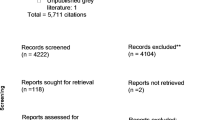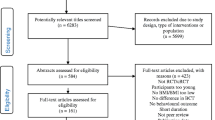Abstract
This paper addresses the question of how older people can be supported to actively self-manage their own process of ageing such that overall wellbeing is achieved and maintained for as long as possible. Starting from a resource-based approach, a new theory of self-management of wellbeing (SMW theory) is proposed, and it is shown how it can be used as a basis for the design of self-management interventions for ageing successfully. The main aspects of the theory, i.e. six key self-management abilities and the core dimensions of wellbeing, are presented as well as the theory-based ‘blueprint’ for the design of interventions. Empirical results of two intervention studies are briefly presented and show that the SMW theory may be a useful tool for the design and evaluation of interventions for successful ageing.

Similar content being viewed by others
Notes
This programme is made possible with the help of a generous grant (014-91-046 and 014-91-056) from the Netherlands Organisation for Health Research and Development—ZonMw.
References
Adelman PK (1994a) Multiple roles and psychological wellbeing in a national sample of older adults. J Gerontol Soc Sci 49:S277–S285
Adelman PK (1994b) Multiple roles and physical health among older adults. Res Aging 16:142–166
Allan G, Adams RG (1989) Aging and the structure of friendship. In: Adams RG, Blieszner R (eds) Older adult friendship: structure and process. Sage Publications, Newbury Park, pp 45–64
Aspinwall LG, Taylor SE (1997) A stitch in time: Self-regulation and proactive coping. Psychol Bul 121:417–436
Baltes MM (1996) The many faces of dependency in old age. Cambridge University Press, Cambridge
Baltes MM, Carstensen LL (1996) The process of successful ageing. Ageing Soc 16:397–422
Baltes PB (1987) Theoretical propositions of life-span developmental psychology: on the dynamics between growth and decline. Dev Psychol 23:611–626
Baltes PB, Baltes MM (1990) Psychological perspectives on successful aging: the model of selective optimization with compensation. In: Baltes PB, Baltes MM (eds) Successful aging: perspectives from the behavioral sciences. Cambridge University Press, Cambridge, pp 1–34
Bandura A (1997) Self-efficacy: the exercise of control. W.H. Freeman and Company, New York
Baumeister RF, Leary MR (1995) The need to belong: Desire for interpersonal attachments as a fundamental human motivation. Psychol Bul 117:497–529
Bode C, De Ridder DTD, Bensing JM (2005) Preparing for aging: development, feasibility, and preliminary results of an educational program for midlife and older based on proactive coping theory. Pat Educ Couns (in press)
Brandtstädter J, Rothermund K (2002) The life-course dynamics of goal pursuit and goal adjustment: a two-process framework. Dev Rev 22:117–150
Bohlmeijer E, Smit F, Cuijpers P (2003) Effects of reminiscence and life review on late-life depression; a meta-analysis. Int J Geriatr Psychiatr 18:1088–1094
Buss DM, Kenrick DT (1998) Evolutionary social psychology. In: Gilbert DT, Fiske ST, Lindzey G (eds) The handbook of social psychology, 4th edn. McGraw-Hill, New York, pp 982–1026
Carstensen LL (1992) Social and emotional patterns in adulthood: Support for socioemotional selectivity theory. Psychol Aging 7:331–338
Carstensen LL, Isaacowitz DM, Charles ST (1999) Taking time seriously: a theory of socioemotional selectivity. Am Psychol 54: 165–181
Clark NM, Janz NK, Becker MH, Schork MA, Wheeler J, Liang J, Dodge JA, Keteyian S, Rhoads KL, Santinga JT (1992) Impact of self-management education on the functional health status of older adults with heart disease. Gerontologist 32:438–443
Connidis I (1989). The subjective experience of aging: Correlates of divergent views. Can J Aging 8:7–18
Deci EL, Ryan RM (1995) Human autonomy: the basis for true self-esteem. In: Kernis M (ed) Efficacy, agency, and self-esteem. Plenum, New York, pp 31–49
Frieswijk N, Steverink N, Buunk BP, Slaets JPJ (2005) The effectiveness of a bibliotherapy in increasing the self-management ability of slightly to moderately frail older people. Pat Educ Couns (in press)
Glass TA, Mendes de Leon C, Marottoli RA, Berkman LF (1999) Population based study of social and productive activities as predictors of survival among elderly Americans. Br Med J 319:478–483
Greenglass ER (2002) Proactive coping and quality of life management. In: Frydenberg E (ed) Beyond coping: meeting goals, visions, and challenges. Oxford University Press, Oxford, pp 37–62
Haken LM, Steverink N, VandenHeuvel WJA, Lindenberg SM (2002) Orientation toward living in an old age home: An instrument to predict use of an old age home. Sc J Caring Sci 16:353–359
Harlow RE, Cantor N (1996) Still participating after all these years: a study of life task participation in later life. J Pers Soc Psychol 71:1235–1249
Heckhausen J, Schulz R (1995) A life-span theory of control. Psychol Rev 102:284–304
Hobfoll SE (1998) Stress, culture, and community: the psychology and philosophy of stress. Plenum, New York
Hobfoll SE (2002) Social and psychological resources and adaptation. Rev Gen Psychol 6:307–324
Isaacowitz DM, Seligman MEP (2002) Cognitive style predictors of affect change in older adults. Int J Aging Hum Dev 54:233–253
Kahana E, Lawrence RH, Kahana B, Kercher K, Wisniewski A, Stoller E, Tobin J, Stange K (2002) Long-term impact of preventive proactivity on quality of life of the old–old. Psychosom Med 64:382–394
Kahn RL (2002) On “successful aging and wellbeing: Self-rated compared with Rowe and Kahn”. Gerontologist 42:725–726
Kahneman D (1999) Objective happiness. In: Kahneman D, Diener E, Schwarz N (eds) Well-being: the foundations of hedonic psychology. Russell Sage Foundation, New York, pp 3–25
Kasser VG, Ryan RM (1999) The relation of psychological needs for autonomy and relatedness to vitality, wellbeing, and mortality in a nursing home. J Appl Soc Psychol 29:935–954
Lam DH, Power MJ (1991) A questionnaire designed to assess roles and goals: a preliminary study. Br J Med Psychol 64:359–373
Lang FR, Carstensen LL (1994) Close emotional relationships in late life: further support for proactive aging in the social domain. Psychol Aging 9:315–324
Lang FR, Featherman DL, Nesselroade JR (1997) Social self-efficacy and short-term variability in social relationships: the MacArthur successful aging studies. Psychol Aging 12:657–666
Lang FR, Heckhausen J (2001) Perceived control over development and subjective wellbeing: differential benefits across adulthood. J Pers Soc Psychol 81:509–523
Levy BR, Slade MD, Kunkel SR, Kasl SV (2002) Longevity increased by positive self-perceptions of aging. J Pers Soc Psychol 83:261–270
Lindenberg S (1996) Continuities in the theory of social production functions. In: Lindenberg SM, Ganzeboom HBG (eds) Verklarende sociologie: opstellen voor Reinhard Wippler [Explanatory sociology: essays in honor of Reinhard Wippler]. Thesis Publishers, Amsterdam, pp 169–184
Lindenberg S (2001) Social rationality versus rational egoism. In: Turner JH (eds) Handbook of sociological theory. Academic/Plenum, New York, pp 635–668
Lorig K, Sobel DS, Stewart AL, Brown BW, Bandura A, Ritter P, Gonzalez VM, Laurent DD, Holman HR (1999) Evidence suggesting that a chronic disease self-management program can improve health status while reducing hospitalization. A randomized trial. Med Care 37:5–14
Maslow AH (1970) Motivation and personality [1954], 2nd edn. Harper & Row, New York
Morgan DL (1988) Age differences in social network participation. J Gerontol Soc Sci 55:S129–S137
Nieboer A, Lindenberg S (2002) Substitution, buffers and subjective wellbeing: a hierarchical approach. In: Gullone E, Cummins RA (eds) The universality of subjective wellbeing indicators. Kluwer, Dordrecht, pp 175–189
Nieboer AP, Lindenberg S, Boomsma A, Van Bruggen AC (2005) Dimensions of wellbeing and their measurement: the SPF-IL Scale. Soc Ind Res 73:313–353
Nieboer AP, Lindenberg SM, Ormel J (1999) Conjugal bereavement and well-being of elderly men and women: a preliminary study. Omega 38:113–141
Ormel J (2002) Social production function (SPF) theory as an heuristic for understanding developmental trajectories and outcomes. In: Pulkkinen L, Caspi A (eds) Paths to successful development: personality in the life course. Cambridge University Press, New York, pp 353–379
Ormel J, Lindenberg S, Steverink N, Verbrugge LM (1999) Subjective wellbeing and social production functions. Soc Ind Res 46:61–90
Pinquart M, Sörensen S (2001) How effective are psychotherapeutic and other psychosocial interventions with older adults? A meta-analysis. J Mental Health Aging 7:207–243
Prenda KM, Lachman ME (2001) Planning for the future: a life management strategy for increasing control and life satisfaction in adulthood. Psychol Aging 16:206–216
Reis HT, Collins WA, Berscheid E (2000) The relationship context of human behavior and development. Psychol Bul 126:844–872
Riley MW, Riley JW (1994) Structural lag: past and future. In: Riley MW, Kahn RL, Foner A (eds) Age and structural lag: Society’s failure to provide meaningful opportunities in work, family and leisure. Wiley, New York, pp 15–36
Rosow I (1976) Status and role change through the life span. In: Binstock RH, Shanas E (eds) Handbook of aging and the social sciences. Van Nostrand Reinhold, New York, pp 457–482
Rowe JW, Kahn RL (1987) Human aging: usual and successful. Science 237:143–149
Rowe JW, Kahn RL (1997) Successful aging. Gerontologist 37:433–440
Sarkisian CA, Hays RD, Mangione CM (2002) Do older adults expect to age successfully? The association between expectations regarding aging and beliefs regarding healthcare seeking among older adults. J Am Geriatr Soc 50:1837–1843
Schulz R, Heckhausen J (1996) A life-span model of successful aging. Am Psychol 51:702–714
Schuurmans H (2004) Promoting well-being in frail elderly people: Theory and intervention. GRoningen Intervention Program (GRIP). Dissertation, University of Groningen. Available at: http://opc.ub.rug.nl
Schuurmans H, Steverink N, Frieswijk N, Buunk, BP, Slaets JPJ, Lindenberg S (2005) How to measure self-management abilities in older people by self-report: the development of the SMAS-30. Quality Life Res (in press)
Schuurmans H, Steverink N, Lindenberg S, Frieswijk N, Slaets JPJ (2004) Old or frail: What tells us more? J Gerontol A Med Sci 59:M962–M965
Seeman TE, Unger JB, McAvay G, Mendes de Leon CF (1999) Self-efficacy beliefs and perceived declines in functional ability: MacArthur studies of successful aging. J Gerontol B Psychol Sci Soc Sci 54:P214–P222
Skinner EA (1996) A guide to constructs of control. J Pers Soc Psychol 71:549–570
Stevens N (2001) Combating loneliness: a friendship enrichment programme for older women. Ageing Soc 21:183–202
Steverink N (2001) When and why frail elderly people give up independent living: The Netherlands as an example. Ageing Soc 21:45–69
Steverink N, Kempen GIJM (1998) Het toekomstperspectief van ouderen: een theoretisch-empirische verkenning [The future time perspective of the elderly: a theoretical-empirical exploration]. Tijdschr Gerontol Geriatr 29:196–204
Steverink N, Lindenberg S (2006) Which social needs are important for subjective well-being and what happens to them with aging? Psychol Aging (conditionally accepted)
Steverink N, Lindenberg S, Ormel J (1998) Towards understanding successful ageing: patterned change in resources and goals. Ageing Soc 18:441–467
Steverink N, Westerhof GJ, Bode C, Dittmann-Kohli F (2001) The personal experience of aging, individual resources, and subjective wellbeing. J Gerontol B Psychol Sci Soc Sci 56:P364–P373
Taylor SE, Dickerson SS, Klein LC (2002) Toward a biology of social support. In: Snyder CR, Lopez SJ (eds) Handbook of positive psychology. Oxford University Press, Oxford, pp 556–569
Taylor SE, Lerner JS, Sherman DK, Sage RM, McDowell NK (2003) Are self-enhancing cognitions associated with healthy or unhealthy biological profiles? J Pers Soc Psychol 85:605–615
Thoits PA (1983) Multiple identities and psychological wellbeing: a reformulation and test of the social isolation hypothesis. Am Soc Rev 48:174–187
Timmer E, Steverink N, Dittmann-Kohli F (2002) Cognitive representations of future gains, maintenance, and losses in the second half of life. Int J Aging Hum Dev 55:321–339
Vallerand RJ, O’Connor BP (1989) Motivation in the elderly: A theoretical framework and some promising findings. Can Psychol 30:538–549
Van Bruggen A (2001) Individual production of social wellbeing: An exploratory study. Thela Thesis, Amsterdam
Van Eijk L (1997) Activity and wellbeing in the elderly. Thesis Publishers, Amsterdam
WHO (World Health Organization) (1985) Targets for Health for all; Targets in Support of the European Regional Strategy for Health for All. WHO Regional Office for Europe, Copenhagen
Zautra AJ, Hoffman JM, Reich JW (1997) The role of two kinds of efficacy beliefs in maintaining the wellbeing of chronically stressed older adults. In: Gottlieb BH (ed) Coping with chronic stress. Plenum, New York, pp 269–290
Author information
Authors and Affiliations
Corresponding author
Rights and permissions
About this article
Cite this article
Steverink, N., Lindenberg, S. & Slaets, J.P.J. How to understand and improve older people’s self-management of wellbeing. Eur J Ageing 2, 235–244 (2005). https://doi.org/10.1007/s10433-005-0012-y
Published:
Issue Date:
DOI: https://doi.org/10.1007/s10433-005-0012-y




